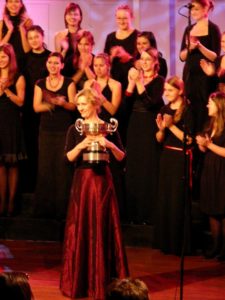Let the Peoples Sing
The EBU Choral Competition 2009 in Oslo
Walter Vorwerk
Music journalist
In 1961, music editors at the BBC came up with the idea to create a special competition to stimulate fine amateur choral singing in Great Britain.. This was also in the thoughts of Pathe, to renew their choral recording stocks with more modern and technically better recordings. At the same time amateur choirs had a platform to perform on the radio. The competition was named “Let the Peoples Sing”, representing the complete breadth of the choral movement. Its success eventually moved outside English borders.
In 1965 the competition was opened to foreign choirs, and in 1966 the competition came under the responsibility of the European Broadcasting Union (EBU). Since 1989 the re-named radio competition has been held every two years, with alternating responsibility among the EBU member stations. From this year’s submissions the jury chose the choirs for the final round, which since 2001 have been presented in a live concert broadcast.
Winners were chosen in the following categories: youth choirs (15-20 years old), children’s choirs (up to age 14), and adult choirs. The overall winner receives a traveling trophy, the “Silver Rose Bowl”. Since the EBU no longer has as much money to invest in the competition, the choirs must now support their own expenses.
Despite this hurdle, the radio competition has remained a worthwhile address on the itineraries of high quality amateur choirs. And a worldwide broadcast is still a big incentive.
The organization is in the hands of the Music Group EBU, whose chairman since May 2009 is the music director of the Saarländischen Rundfunk, Friedrich Spangenmacher. His deputy chair, Jorunn Hope, is responsible for international exchange for the Norwegian network NRK Oslo.
It was like their first big test to organize this competition and the final round “Let the Peoples Sing” in Oslo. It is praiseworthy that the EBU furthers the development of choral music in this way, in calling amateur choirs to raise the level of their performance. This is also true of radio stations which sent very good amateur choirs to the competition, giving them support. For example, Deutschlandradio Kultur nominated the men’s ensemble Camerata Musica Limburg, directed by Jan Schumacher. At the festival of German choral associations in Bremen in 2008, this ensemble won two first prizes and the special prize of the broadcasters, a CD production. Afterwards the radio station and the ensemble made a media partnership under which they were sent to the “Let the Peoples Sing” competition. After a successful semifinal the choir flew to Oslo on October 18th for the finals. This excellent choir returned home without a prize, perhaps due to the perception their program was too “heavy” (including a world premiere – the only one of the evening), perhaps not keeping the motto “Let The Peoples Sing” enough in consideration.
The girls’ choir from the Classical Gymnasium of the Diocese of Ljubljana, Slovenia, under the direction of Helena Fojkar Zupancic, made a particularly strong impression. With their choice of programming, ranging from sacred music to Slovenian folksong in excellent arrangements, and their wonderfully blended choral sound brought them the first prize in the youth choir category, and the traveling trophy “Silver Rosebowl” for excellence as the overall winner.

Among the finalists were choirs from Austria, Poland, Canada, Lithuania, Finland, Germany and Norway, where the Nova Kammerchor under Anne Karin Sundal-Ask won 1st prize in the adult choir category.
Ingval Eikaas, the music division head from NRK Oslo, said this about the competition:
We have heard excellent choirs here. I think it’s important to reach listeners, particularly the young listeners. It not only has to do with broadcasting to many countries through the EBU, but also to use other electronic means, for example the online connection, the websites, to show these choirs around the whole world, to show how they sing. This is the modern way to reach listeners.
Jorunn Hope, the new deputy chief of the EBU music group, adds:
In my opinion, choral music is a very important part of the music offerings on the radio. It’s right to reach listeners across borders with high-quality music. In the past, we had “radio people” on the jury, but this year we had for the first time a conductor from Estonia who led his children’s choir to a prize in Cologne two years ago. Also, we need feedback from choirs and associations for “Let the Peoples Sing”. in this way the response can be much larger. It’s interesting that not just European choirs participated – this year we had a Canadian choir here, and an associate jury member came from America. This broadening makes this radio competition more attractive for the choirs.
In this way, the EBU competition “Let the Peoples Sing” has a perspective – it is no longer just a radio opportunity, but it is becoming more and more an international institution with an international broadcast.
E-Mail: walter.vorwerk@gmx.de
Translated from the German by Dr. Clayton Parr, DePaul University School of Music, USA